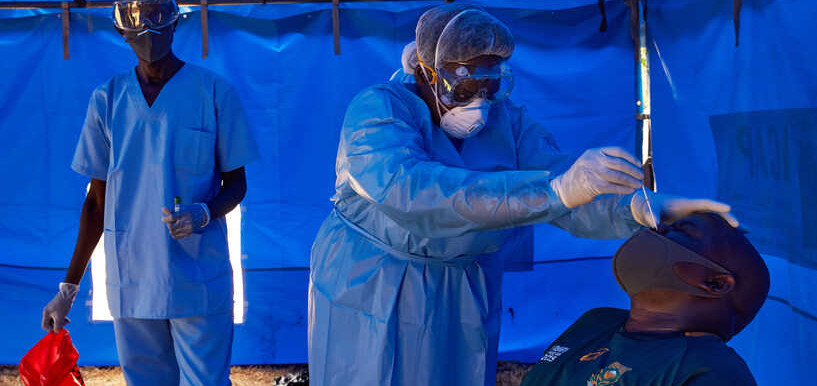Coronavirus patients in Yei River County of Central Equatoria State in South Sudan are complaining about a lack of medical service and food assistance as they continue observing COVID-19 preventative measures within their respective homes in Yei town.
Medical officials in Yei confirmed at the end of May that there were five COVID-19 positive patients undergoing self-isolation at home on close monitoring and supervision.
Charles Kaluga, one of the COVID-19 patients, told Radio Tamazuj at the end of May that since he tested positive on April 30, he has been surviving on his pocket and he is finding it difficult to access food and other basic needs.
“The money I came with from Juba which I planned for starting a small business in Yei town is over,” Kaluga said. “Currently I am suffering because I have been told not to move anywhere and I have not been given any food ration.”
The patient also pointed out that his situation has become so hard even finding a mere soap for washing his clothes remains a big challenge at the moment.
“I am calling on the government and the NGOs to help us with basic needs,” Kaluga said.
The Director General in the defunct Yei state ministry of health, Dr. James Wani, told Radio Tamazuj there are funding challenges in providing food assistance to patients.
“The biggest challenge here is funding and food, the five positive patients are staying at their homes and they are demanding food to help them,” said the health official.
Wani added that the former ministry is working to sensitize the patients on the preventative measures and urging them to stay at their homes all the time.
This is part of the World Health Organization’s (WHO) recommendation of isolating people who are sick so they don’t spread the disease.
“People can catch COVID-19 from others who have the virus,” the WHO says on its website. “The disease spreads primarily from person to person through small droplets from the nose or mouth, which are expelled when a person with COVID-19 coughs, sneezes, or speaks.”
The patient, Kaluga, further complained that he is not undergoing any medical treatment since he was isolated at his home.
“The medical personnel used to check on us but we are not given drugs for treating COVID-19,” he said.
WHO has said there is no current treatment to cure patients of COVID-19. Usually people with minor cases get better within about two weeks and more serious cases can recover in between 3 and 6 weeks, according to a WHO report.
“While some western, traditional or home remedies may provide comfort and alleviate symptoms of mild COVID-19, there are no medicines that have been shown to prevent or cure the disease,” according to the WHO website. “WHO does not recommend self-medication with any medicines, including antibiotics, as a prevention or cure for COVID-19. However, there are several ongoing clinical trials of both western and traditional medicines.”
Director General Wani said the patients are not eligible for treatment because they are not undergoing critical conditions.
As well, a WHO representative told Radio Tamazuj last month South Sudan’s health care system is poorly prepared for coronavirus.
“South Sudan’s health sector lacks medical personnel, modern healthcare equipment and many citizens still find it difficult to access the existing health facilities in many parts of the country,” said Dr. Emmanuel Timothy, the head of the WHO in Upper Nile State.
Rose Yabu, a caretaker of her two parents who tested positive in April, said her parents are living under stress and trauma due to lack of food and medical assistance in the isolation centre.
“My parents are not given medicines to swallow and what the medical workers are doing every morning is only to examine their body temperature and my parents are left without any assistance,” she said.
Yabu is calling on the government to provide food and medical treatment for her parents who are at their old ages staying indoors without mental and moral support.
Yabu stated that she was told to stay home, but she couldn’t do that because currently her parents have nothing to eat and her mother is always unhappy because there is no food in the house to eat. She said the spread of coronavirus is real in Yei and calls on the government to enforce more preventative measures against the deadly pandemic.
“Coronavirus is real and the people in Yei should know that coronavirus is already circulating in Yei,” she said. “People should stick to personal preventative measures and those who are tested positive should also protect themselves.”




